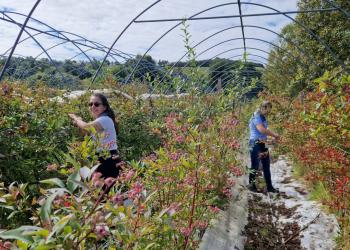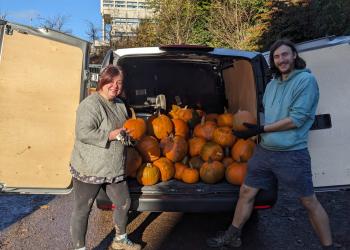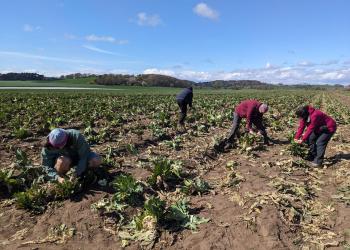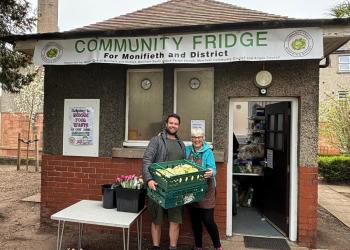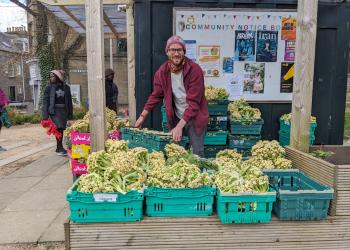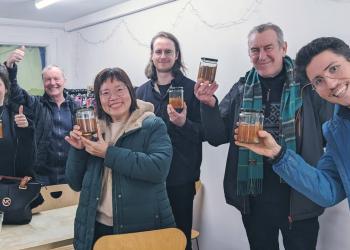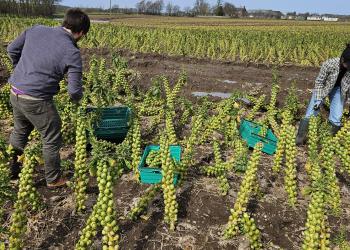To further reduce food waste locally, through our Community Fridge and a new Gleaning Project.
Definition:
to glean: to gather (leftover grain) after a harvest.

Reducing Food Waste in Dundee
Go To WebsiteAddressed Challenges:
- Health & Wellbeing
- Food Security & Supply
- Carbon Emissions
- Waste / Circular Economy
- Greater Fairness / Just Transition
- Excessive Consumption
Action Areas:
- Circular Economy
- Transport
- Land Use, Food & Agriculture
Initiative Purpose:
The Story
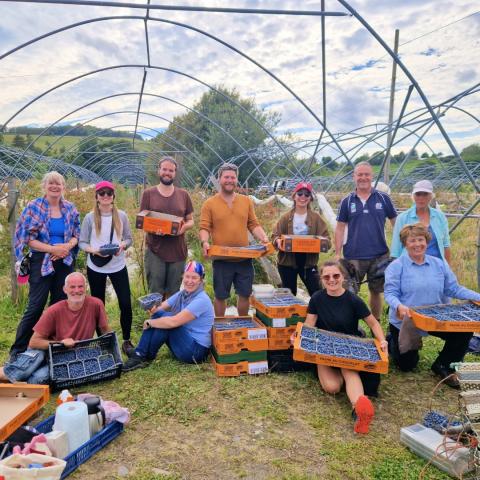
We applied for the fund for three main reasons:
- To set up a Gleaning Project
- To buy an electric van to reduce carbon emissions from our Community Fridge project - allowing us to collect more food from other sources
- To increase community engagement around food waste
In our first year we aimed for The Gleaning Project to help with two main needs: (1) reducing food waste on farms and (2) using this saved produce to provide more healthy fresh food to communities where it is lacking. Equipped by The Gleaning Network, their useful toolkit for getting started and wealth of knowledge on the causes of food waste on farms, we set out to establish relationships with local growers. They advised us to aim for 10 gleaning days in the first year, we actually managed 16 days. We worked with Dundee Community Food Network to identify and connect with food banks, larders, community fridges, cafes and kitchens.
On our first gleaning day, with the help of 4 volunteers, we managed to save 90kg of blackberries - this produce was shared amongst 10 community projects. Steadily this grew culminating in our last gleaning session - where we saved 992kg of cauliflowers, carried out with 32 volunteers and distributed amongst 26 projects in Dundee and Fife. In addition to this the electric van contributed to our West End Community Fridge’s collections of excess produce from local food retailers and the local depot of the food surplus redistribution charity Fareshare - we went from collecting 54 tonnes of surplus food from local businesses to the previous year to almost 80 metric tonnes. An additional 4 tonnes were collected through the Gleaning Project. The weight of food harvested through gleaning was less than expected, but that’s mostly because we did a lot of berry farms, which were more time-consuming and quite light (but very much appreciated).
From our very first gleaning session volunteers reported their improved wellbeing by being actively involved in saving food from waste and feeling a greater sense of agency and hope with regards to tackling sustainability and social issues. Another frequently disclosed benefit was mental and physical benefits from connection to nature and a flexible manual task. All these benefits helped us to successfully apply for continuation funding from the NHS Tayside Charitable Foundation!
Many community projects shared stories and pictures of produce received. It brought real positivity to the Food Network at a time when its resources, time, and energy were stretched. The food was used in many ways - directly distributed to community members or in community cooking and baking sessions.
Lastly, we wanted to increase engagement with our community on food waste through increased events at The Community Fridge, and running more food-themed workshops. We aimed for 12 but managed to do 17 - and included everything from food waste tips at the Community Fridge to workshops on eating more plant-based foods and using fermentation to preserve food.
Success & Outcomes
- To increase the weight of food surplus collection and redistribution through both the Gleaning Project and purchasing an EV, from 54 tonnes to ~83.8 tonnes: 79.7 T Community Fridge (54 T previous year), 4.1 Gleaned = 83.8 in total
- Ran 16 gleaning days throughout the year
- Engaging 338 people in 17 food waste workshops/workshops
- More people on low incomes in Dundee have dignified access to food: 31,739 visits to the Community Fridge (25k previous year) 75,459 people ate the food from the Community Fridge alone + a lot more through food given to other food projects (58k previous year)
- More volunteering opportunities are available to people in Dundee through the Gleaning Project: 62 new volunteers
- Local CO2e emissions are lowered by reducing food waste through the Gleaning Project and collecting more food through the Community Fridge: 258 Metric Tonnes of CO2e
- More fresh/healthy/local food was made available to local food projects, through DCFN and beyond: 41 other projects shared the food.
- The Gleaning project brings many additional benefits to our community than foreseen: Mental and physical health of volunteers, and increased positivity amongst DCFN projects
Advice for others looking to do something similar
People are really interested to learn from you, and your experience can inspire others. Every initiative has something different to teach us.
The Gleaning Network’s resources for starting a gleaning group were invaluable. In particular helping us to understand the issues surrounding food waste and why it occurs on farms, while also putting across the farmer's perspective on the value of gleaning and the need to fully understand the risks and concerns they may have before agreeing to it on their farms. The issue of having sufficient insurance to cover gleaning activities while on the farm has been consistently highlighted by farmers as their main concern along with appropriate risk assessments and first aid training and provisions in case of accidents or emergencies.
Media coverage of the issue through written articles and radio features (such as: https://www.bbc.co.uk/news/uk-scotland-tayside-central-66948456) have helped with both recruiting more volunteers and with raising awareness of gleaning among the growing community. I think this has helped develop these relationships and improve the trust in our project. Similarly, it was the first couple of gleaning days which enabled us to take advantage of these media opportunities which also (given the closeness of the growing community) improved trust and familiarity.
It was inspiring to see other gleaning groups around the country who have been operating for a few years, seeing how much they have grown and the network of growers and volunteers they have developed was motivating - Gleaning Cornwall for example.
Transport has been another key challenge in growing our gleaning activities. Nearly all gleaning locations have been predictably rural with limited access via public transport, this combined with finding that many volunteers keen to participate will not have access to their own transport. Where possible we have shared transport to reduce the environmental impact of our travel, but the main issue has been finding enough drivers in the first place. Going forward we have an agreement with Alexander’s Community Development to use their minibus for transport on gleaning days.
Regarding volunteer recruitment, we initially relied upon our existing volunteer network from our other projects. However, we soon found that word of mouth from volunteers who had experienced the joys and benefits of gleaning (such as connection to nature and connecting with like-minded individuals) was the most effective way to gain new volunteers. Promoting the gleaning through the community food projects receiving gleaned produce also proved a great way to gain both interest in the project generally and new volunteers.
Find out more:
https://www.transitiondundee.com/
https://www.facebook.com/TransitionDundee/
